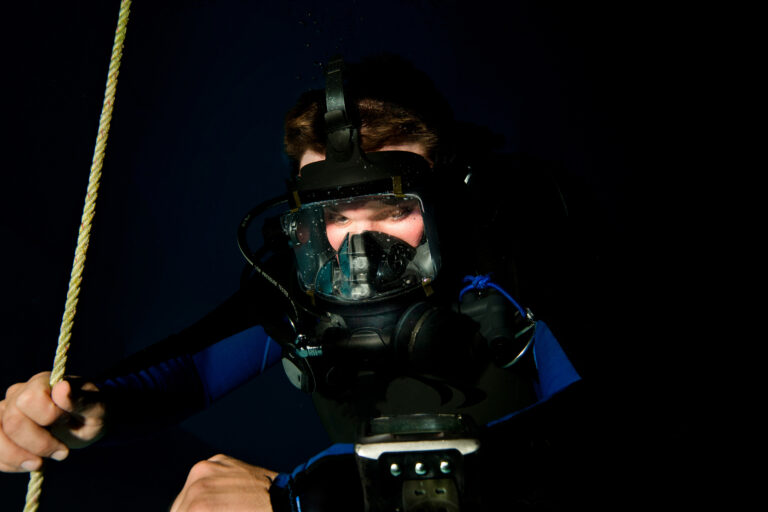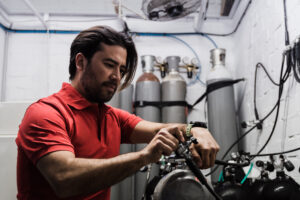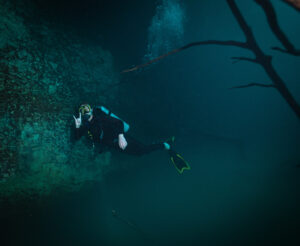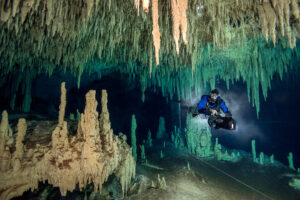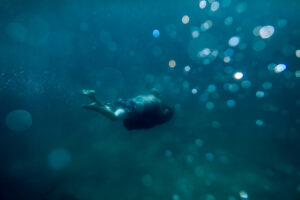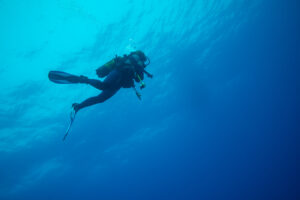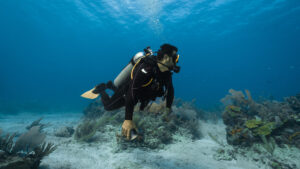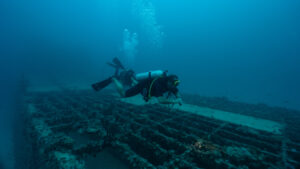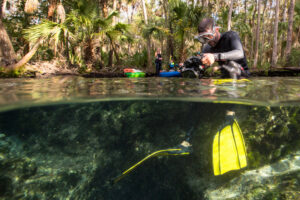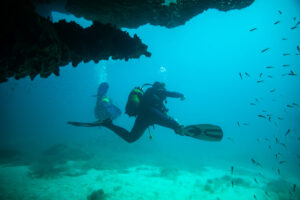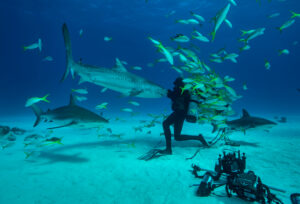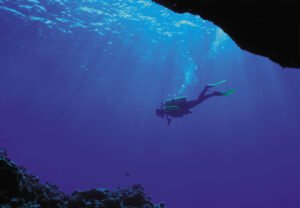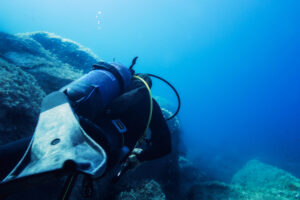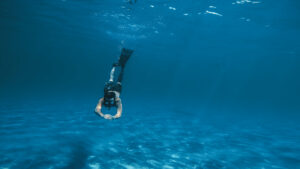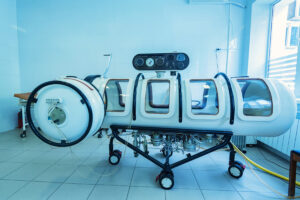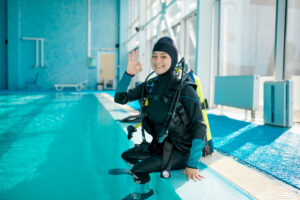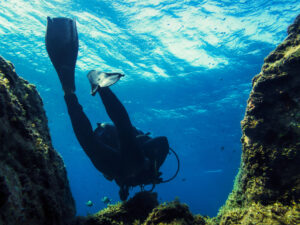What is a Full Face Mask (FFM)?
A full face mask (FFM) is an essential piece of equipment designed for scuba diving and snorkeling. Full face masks provide comfort, safety, and optimal breathing capabilities to divers. As its name suggests, the full face mask covers the user’s face including eyes, nose, and mouth. This allowes the diver to breathe comfortably underwater while simultaneously offering clear vision and protection from water intrusion. This advanced diving gear has gained popularity in recent years due to its numerous advantages over traditional diving masks and regulators.
History
The history of the full face mask can be traced back to the 1930s when diving helmets were in use for underwater exploration. These early helmets were cumbersome and limited in functionality, but they paved the way for the development of lighter and more streamlined equipment. The modern full face mask has undergone several iterations, with continuous improvements in design and materials to provide divers with enhanced performance, durability, and comfort.
Design
The full face mask is typically constructed from high quality silicone, rubber, or other elastomeric materials, which form a comfortable and watertight seal around the diver’s face. The mask’s lens, usually made of tempered glass or polycarbonate, offers a wide field of vision and is designed to withstand pressure at various depths.
One of the most significant features of a full face mask is the integrated regulator, which supplies the breathing gas to the diver. This regulator is connected to the diver’s air source and has a demand valve that provides air as needed. In some designs, the regulator is built into the mask, while in others, it is detachable and can be connected to a separate mouthpiece.
Benefits of using a Full Face Mask
Enhanced Breathing Comfort
Full face masks serve as an essential tool for divers, covering not only the mouth and nose but also the eyes, thus providing a comprehensive protective barrier. What sets this type of mask apart from traditional ones is its capacity to facilitate natural breathing. Divers can inhale and exhale through both the mouth and nose, emulating the usual breathing pattern experienced on land. The seamless integration of this mask into the diver’s respiratory process eradicates the discomfort commonly associated with using a traditional mask and regulator, thereby significantly improving the overall diving experience.
Improved Communication
One of the most innovative features of full face masks is the integration of built-in communication systems. This addition has revolutionized underwater communication, enabling divers to converse and listen to each other while submerged. The benefits of this system are multifaceted: it not only enhances safety by facilitating real-time conversation and alerts but also promotes efficient coordination during group or technical dives. The necessity for precise communication during these types of dives cannot be overstated, and full face masks with communication systems provide an invaluable solution.
Reduced Fogging
One common issue that divers face is lens fogging, which can significantly impair visibility underwater. Full face masks offer a unique solution to this problem by separating the breathing chamber from the viewing area. This ingenious design prevents the warm breath from coming into contact with the cooler lens, thereby eliminating the chance of fogging. As a result, divers using full face masks enjoy a consistently clear view throughout their underwater adventure, enhancing both their safety and enjoyment.
Protection from Cold Water
Another compelling advantage of full face masks is their thermal protection capability. The comprehensive coverage these masks offer shields the diver’s face from direct contact with the water, particularly beneficial in colder environments. By insulating the face, these masks help to maintain body temperature and prevent the discomfort or potential dangers associated with prolonged exposure to cold water. Thus, full face masks serve not only as a tool for improved visibility and communication but also as a protective device against harsh underwater conditions.
Greater Security
Lastly, full face masks provide divers with a heightened sense of security. Designed to securely fit the face, these masks offer a wide field of vision, reducing the risk of dislodgment or loss. The potential for water leaks or the unsettling experience of mask squeeze is also significantly lessened, providing divers with a more secure and comfortable experience. This added security allows divers to focus on the exploration and enjoyment of their underwater surroundings, confident in the knowledge that their mask will remain firmly in place and function effectively throughout their dive.
Types of Full Face Masks for Scuba Diving
There are two primary types of full face masks:
Integrated Full Face Mask
Integrated full face masks represent a significant advancement in diving technology. These masks incorporate a built-in regulator, creating a streamlined system that permits the diver to breathe directly through the mask without the necessity for a separate mouthpiece. This design increases convenience and simplifies the diver’s gear, effectively eliminating the traditional, separate components. An integrated full face mask offers a range of benefits that have made it a popular choice among recreational divers. One of the key advantages is its ease of use, providing an intuitive and comfortable user experience. In addition, the design reduces the risk of jaw fatigue, a common issue experienced by divers using conventional mouthpieces. By providing a more natural way to breathe underwater, integrated full face masks have enhanced the recreational diving experience, contributing to their growing popularity.
Modular Full Face Mask
Modular full face masks are a versatile and adaptable option in diving equipment. This type of mask is designed with a detachable regulator, providing divers with the flexibility to alternate between a full face mask configuration and a traditional setup featuring a separate regulator. This interchangeability allows divers to customize their equipment based on their needs, the specific diving scenario, or personal preference. Due to this high level of adaptability, modular full face masks have become a popular choice among technical divers and professionals. These divers often find themselves in a variety of diving situations that require different equipment setups. The ability to transition seamlessly between a full face mask and a traditional mask, without the need for entirely separate equipment, makes modular full face masks an invaluable asset for advanced diving operations. In summary, the modular full face mask is an embodiment of flexibility and adaptability, earning its place in the toolkit of professional divers.
Selecting the Right Full Face Mask
When choosing a full face mask, it’s essential to consider the following factors:
Fit and Comfort
In the realm of underwater exploration, the fit and comfort of a dive mask plays a crucial role in dictating the overall diving experience. A mask should conform securely to the face, fitting snugly yet comfortably enough to avoid creating discomfort or inducing pressure points. This careful balance ensures a pleasant dive experience while also preventing fatigue from prolonged wear. Moreover, the mask should establish a watertight seal around the contours of the face, acting as a reliable barrier against water intrusion. This seal is essential as it maintains the internal environment of the mask, protecting the diver’s eyes and nose from direct exposure to water, thereby ensuring clear vision and facilitating easier breathing.
Field of Vision
The field of vision provided by a dive mask is a critical aspect that directly influences a diver’s ability to navigate and react to their underwater surroundings. Ideally, a mask should offer a wide field of vision, enabling the diver to maintain better situational awareness and subsequently increasing their safety underwater. A low-volume design is often recommended in this regard as it brings the lenses closer to the eyes, thus expanding the peripheral vision. Masks with this design minimize obstructions, providing an unimpeded view that allows divers to fully appreciate the underwater world while ensuring they can identify and respond to potential hazards swiftly.
Quality and Durability
The quality and durability of a dive mask are vital characteristics to consider, given the rigorous demands of diving environments. When selecting a mask, it’s advisable to opt for one manufactured from high-quality materials that demonstrate resilience against the unique challenges presented by diving. These challenges include rapid pressure changes during descents and ascents, potential abrasions from underwater debris, and constant exposure to saltwater, which can degrade less durable materials over time. A mask that meets these criteria will not only offer long-term reliability but also enhance the safety and enjoyment of your diving experiences.
Regulator Performance
An essential component of any dive mask is the regulator, which is either integrated into the mask or comes as a separate modular unit. The regulator’s performance significantly influences the diver’s ability to breathe comfortably underwater. It should deliver a smooth, consistent airflow, reducing the effort required for each breath and ensuring an uninterrupted supply of air. Additionally, compatibility with the diver’s existing diving equipment is a crucial consideration. An incompatible regulator could lead to difficulties in managing the dive and potential safety risks. Therefore, ensuring that your chosen mask’s regulator aligns with your existing equipment will contribute to a seamless and safe diving experience.”
Communication Capabilities
For those who require underwater communication, select a mask with a built-in communication system or compatibility with third-party devices.
Ease of Maintenance
Choose a mask with easily replaceable parts and a design that allows for simple cleaning and maintenance.
Certifications and Standards
Make sure that the full face mask meets relevant safety and performance standards, such as those established by the American National Standards Institute (ANSI), European Committee for Standardization (CEN), or the International Organization for Standardization (ISO).
Training and Certification for Diving with a Full Face Mask
While full face masks offer numerous benefits, they also require specific skills and techniques for proper use. Consequently, it is crucial for divers to undergo appropriate training and certification before using a full face mask. Several diving organizations, such as PADI (Professional Association of Diving Instructors), NAUI (National Association of Underwater Instructors), and SSI (Scuba Schools International), offer specialized full face mask courses. These courses cover topics such as mask fitting, underwater communication, regulator adjustments, buoyancy control, and emergency procedures.
Safety Considerations when Diving with a Full Face Mask
Despite their many advantages, full face masks also have potential risks that divers should be aware of:
Over-breathing
Since full face masks provide an abundant supply of air, divers may be prone to over-breathing, leading to increased air consumption and shorter dive times. Proper training can help divers manage their breathing rates effectively.
Flooding and Clearing
Clearing a flooded full face mask can be more challenging than a traditional mask. Divers must learn specific techniques to deal with mask flooding and be prepared for potential emergencies.
Equalization
Some divers may find it more challenging to equalize ear pressure while wearing a full face mask. Specialized training will help divers master equalization techniques specific to full face masks.
Full face masks have revolutionized scuba diving and snorkeling experiences by providing enhanced comfort, improved communication, and a more natural breathing experience. By selecting the right mask, undergoing proper training, and following safety guidelines, divers can fully enjoy the numerous advantages that full face masks have to offer.

